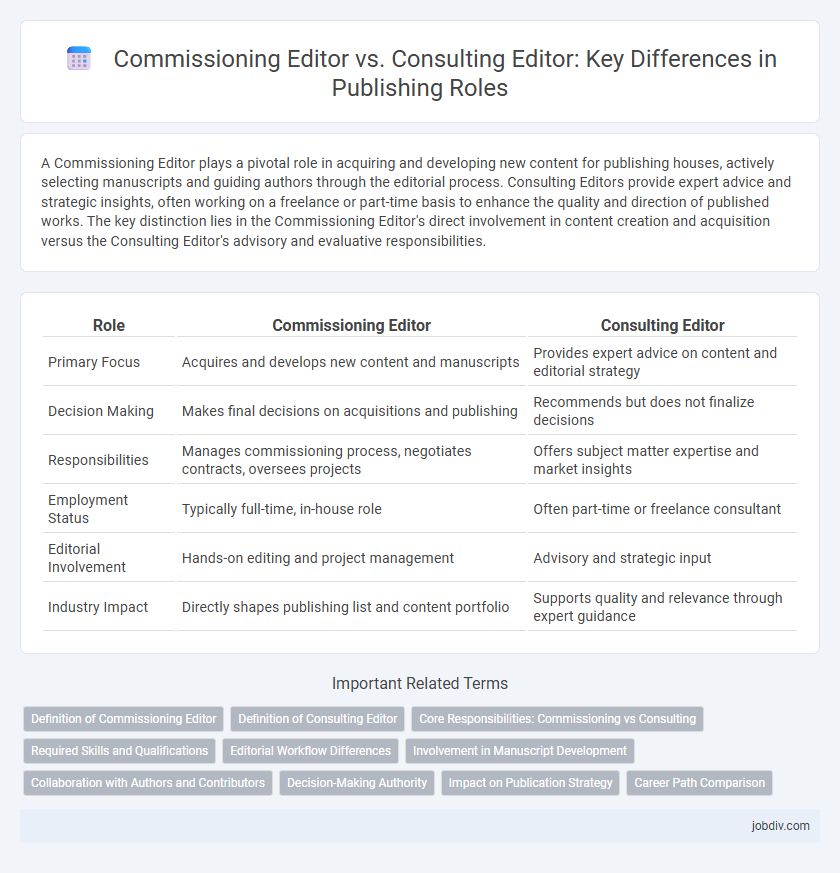A Commissioning Editor plays a pivotal role in acquiring and developing new content for publishing houses, actively selecting manuscripts and guiding authors through the editorial process. Consulting Editors provide expert advice and strategic insights, often working on a freelance or part-time basis to enhance the quality and direction of published works. The key distinction lies in the Commissioning Editor's direct involvement in content creation and acquisition versus the Consulting Editor's advisory and evaluative responsibilities.
Table of Comparison
| Role | Commissioning Editor | Consulting Editor |
|---|---|---|
| Primary Focus | Acquires and develops new content and manuscripts | Provides expert advice on content and editorial strategy |
| Decision Making | Makes final decisions on acquisitions and publishing | Recommends but does not finalize decisions |
| Responsibilities | Manages commissioning process, negotiates contracts, oversees projects | Offers subject matter expertise and market insights |
| Employment Status | Typically full-time, in-house role | Often part-time or freelance consultant |
| Editorial Involvement | Hands-on editing and project management | Advisory and strategic input |
| Industry Impact | Directly shapes publishing list and content portfolio | Supports quality and relevance through expert guidance |
Definition of Commissioning Editor
A Commissioning Editor is responsible for acquiring new content, identifying market trends, and commissioning authors to produce manuscripts that align with the publisher's strategy. This role involves developing editorial proposals, negotiating contracts, and managing the publishing timeline to ensure successful project completion. Unlike a Consulting Editor, who provides expert advice and reviews specific content, the Commissioning Editor drives content acquisition and market positioning.
Definition of Consulting Editor
A Consulting Editor is a seasoned publishing professional who provides specialized expertise and strategic advice without being involved in daily editorial operations. Unlike a Commissioning Editor who actively selects and manages content acquisition, the Consulting Editor offers guidance on editorial direction, market trends, and content evaluation. This role enhances decision-making processes by leveraging extensive industry knowledge to shape the publishing portfolio.
Core Responsibilities: Commissioning vs Consulting
A Commissioning Editor primarily focuses on identifying, evaluating, and acquiring new content or manuscripts for publication, driving the editorial direction and market alignment of the publishing house. In contrast, a Consulting Editor offers expert advice on manuscript development, editorial strategy, and market trends without direct responsibility for acquiring new works. The core responsibility of Commissioning Editors centers on content acquisition, while Consulting Editors concentrate on providing strategic guidance and enhancing editorial quality.
Required Skills and Qualifications
A Commissioning Editor requires strong market analysis skills, editorial judgment, and the ability to manage author relationships and project deadlines, often necessitating a background in publishing or journalism and a keen understanding of audience trends. A Consulting Editor must possess deep subject matter expertise, extensive editorial experience, and excellent advisory capabilities to guide content strategy and quality without direct project management responsibilities. Both roles demand exceptional communication skills, attention to detail, and a proficiency in digital publishing tools.
Editorial Workflow Differences
A Commissioning Editor primarily drives content acquisition by identifying potential authors, commissioning works, and managing project timelines, ensuring alignment with publication goals. In contrast, a Consulting Editor provides expert advice on editorial policies and content quality, often intervening at advanced stages to refine manuscripts without direct involvement in initial content sourcing. These distinct roles create a workflow where the Commissioning Editor initiates and oversees editorial projects, while the Consulting Editor enhances and validates content in the later editorial stages.
Involvement in Manuscript Development
A Commissioning Editor plays a pivotal role in manuscript development by identifying promising content, guiding authors through revisions, and shaping the work to align with the publisher's vision. In contrast, a Consulting Editor offers expert advice on content quality and market relevance without direct involvement in the editorial process or author collaboration. The Commissioning Editor's hands-on engagement ensures that manuscripts are thoroughly refined, while the Consulting Editor's input primarily supports strategic decisions and content evaluation.
Collaboration with Authors and Contributors
Commissioning editors collaborate closely with authors by identifying potential projects, negotiating contracts, and providing ongoing guidance to shape manuscripts according to market trends and editorial standards. Consulting editors offer specialized expertise, advising on content development and refining manuscripts, often without direct involvement in contract negotiations or project initiation. Both roles enhance the publishing process through strategic cooperation, ensuring high-quality, market-ready publications aligned with the publisher's goals.
Decision-Making Authority
A Commissioning Editor holds substantial decision-making authority, overseeing manuscript selection, contract negotiations, and overall editorial direction to align with the publisher's strategy. In contrast, a Consulting Editor provides expert advice and industry insights without direct control over final publication decisions. The distinction in authority directly influences workflow, with Commissioning Editors shaping content portfolios while Consulting Editors support through advisory roles.
Impact on Publication Strategy
A commissioning editor shapes publication strategy by selecting manuscripts that align with the publisher's goals, ensuring market relevance and audience engagement. A consulting editor provides expert advice on content quality and thematic direction, influencing strategic decisions without direct selection authority. Their combined input enhances a publication's coherence, market positioning, and long-term editorial success.
Career Path Comparison
Commissioning Editors typically advance through roles in editorial or publishing departments, gaining expertise in market analysis and content acquisition, often transitioning to senior editorial or managerial positions within publishing houses. Consulting Editors usually build careers based on specialized subject matter knowledge, frequently balancing advisory roles with independent projects or academic affiliations, leading to opportunities as industry experts or freelancers. Both paths emphasize content curation and strategic decision-making but differ in engagement level with day-to-day editorial operations and long-term career stability.
Commissioning Editor vs Consulting Editor Infographic

 jobdiv.com
jobdiv.com